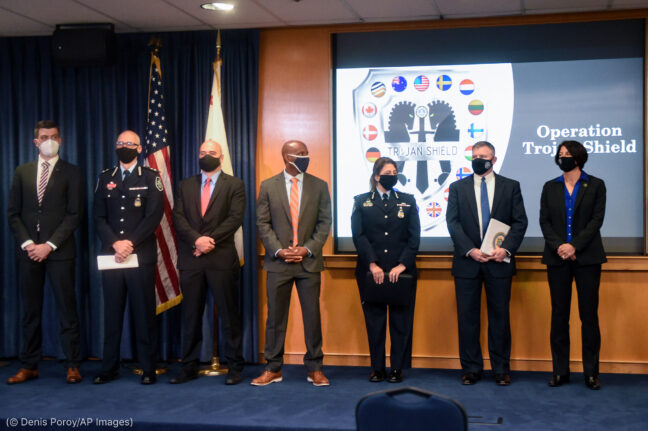
U.S. law enforcement works with counterparts worldwide
By Lauren Monsen
Source: Shareamerica.gov
At a San Diego news conference in June, U.S. and Australian law enforcement officials stand in front of a logo of Operation Trojan Shield, a global sting operation involving a messaging app. (© Denis Poroy/AP Images)
Crime doesn’t respect national boundaries. That’s why every day, U.S. law enforcement professionals join their counterparts in other countries to catch transnational criminals.
The law enforcement officers train together, share information and resources, and cooperate on sophisticated apprehension missions.
Transnational crimes include a range of offenses:
Terrorism.
Cybercrime.
Arms smuggling.
Drug trafficking.
Human trafficking.
Wildlife trafficking.
Counterfeiting.
Money laundering.
Here are examples of how different U.S. government agencies work with international partners to find and prosecute the perpetrators:
U.S. Department of State
The U.S. Department of State’s Bureau of International Narcotics and Law Enforcement Affairs (INL) works with partners in 90 countries combating drug trafficking, corruption and transnational crime. Partners include other nations, international and regional organizations, nongovernmental organizations, and U.S. federal, state and local criminal justice entities.
The bureau runs the International Law Enforcement Academies (ILEAs) in Accra, Ghana; Bangkok; Budapest, Hungary; Gaborone, Botswana; San Salvador, El Salvador; and Roswell, New Mexico, in the United States.
Since 1995, those academies have trained 75,000 senior and midlevel law enforcement officers from 100 countries. Instructors from 15 U.S. federal law enforcement agencies teach specialized courses. “In every class at ILEA San Salvador, students develop associations and alliances that last throughout [their] careers and that help stop transnational organized crime,” said ILEA San Salvador Deputy Director Carl Beckett, who comes from the Drug Enforcement Administration.
The ILEAs are only one source of training. INL’s state and local partnership leverages U.S. state and local criminal justice agencies to train international criminal justice system officials (3,100 during a recent four-year period).
INL program coordinator Cathy Marchese said professionals share both best practices and the challenges they face. “Overseas criminal justice practitioners … are talking to someone who does the same job that they do. This creates an immediate level of collegiality and makes the information more relevant,” she said.
Because criminals travel to avoid detection, the State Department helps build the cross-border ties needed to catch them. Thirty-year police veteran Kara Rose is one of 70 criminal justice experts who help INL design these programs. Involving citizens, she said, “lets overseas partners find ways to work with their communities to solve crimes and increase security.”
Today’s criminals increasingly work in cyberspace. Think ransomware incidents or digital theft of copyright. The U.S. Transnational and High-Tech Crime Global Law Enforcement Network, managed by the departments of State and Justice, builds capacity to investigate and prosecute this kind of activity. It makes U.S. federal mentors and a global network of digital-crime experts available to law enforcement officers in partner countries.
U.S. Department of Justice
At the Department of Justice, the U.S. Drug Enforcement Administration (DEA) and the Federal Bureau of Investigation (FBI) combat transnational crime.
The DEA targets and investigates drug trafficking, money laundering and related transnational criminal organizations affecting the United States and its citizens.
Operation Trojan Shield gathered information that has led to arrests of 800 alleged criminals.
Its investigations have pursued the biggest drug traffickers in the world, including Pablo Escobar and Joaquin “El Chapo” Guzman. In any given month, news reports will cite arrest operations in which the agency played a significant role.
The DEA’s 91 offices span 69 countries and offer courses to U.S. officials’ host-nation counterparts on pursuing drug-related and money-laundering investigations, leadership, personnel management, ethics and crisis management.
For 70 years, the FBI has stationed special agents overseas. By building relationships with law enforcement, intelligence and security services there, the bureau ensures the regular exchange of information. Today, the FBI has 63 legal attaché offices and two dozen smaller sub-offices in key cities around the globe in 180 countries, territories and islands. Each office is established through mutual agreement with the host country and is situated in the U.S. Embassy or Consulate there.
U.S. agents escort Mexican drug lord Joaquin “El Chapo” Guzman from a plane in New York in 2017. (© U.S. law enforcement/AP Images)
The FBI also trains foreign officers in evidence-collection and investigative methods.
Recently, the FBI — coordinating with the Australian Federal Police, Europol (the European Union’s law enforcement agency) and some dozen other nations — developed an encrypted communications platform that was used by some 12,000 devices in the hands of criminal organizations. Operation Trojan Shield has led to the arrest of 800 alleged criminals so far.
U.S. Coast Guard
The Coast Guard also works with global partners and trains foreign personnel. It offers classes for visiting international students and sends its mobile training teams abroad.
The Coast Guard’s international training, technical assistance and professional exchanges benefit regional objectives such as combating illegal, unreported or unregulated fishing, which threatens seafood stocks and jeopardizes the livelihoods of legitimate fishermen.
Coast Guard Shiprider agreements permit its or a partner nation’s officers to search suspect vessels on behalf of the other country. For instance, these agreements allowed U.S. Coast Guard units serving aboard foreign-flagged navy ships to seize 4,466 kilograms of cocaine and 454 kilograms of marijuana in the past six months.
“Shiprider agreements expanded maritime enforcement authorities and prevented illicit actors from exploiting international law and jurisdictional limits,” the Coast Guard’s Brian Chapman said.
